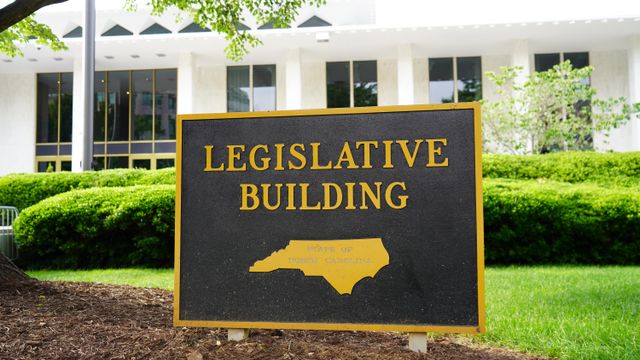NC House votes overwhelmingly to approve bill defining antisemitism
North Carolina lawmakers voted Wednesday to approve a bill that would add a broad definition of antisemitism to state law — a move that comes amid the backdrop of war in the Middle East and protests on college campuses, including at the UNC-Chapel Hill.
The bill, called the Shalom Act by sponsors, would use a definition created by the International Holocaust Remembrance Alliance, which some say is too broad and could limit the right to free speech. It now goes to the state Senate for further debate and a potential vote there.
House Bill 942, pushed by the top Republican leader in the state House, advanced through a House Judiciary committee Wednesday afternoon, before being fast-tracked to the House floor for a vote, where it passed 105-to-4.
"We have seen in recent weeks just ridiculous conduct by some engaging in hate speech, engaging in physical assaults, engaging in vandalism, other criminal acts simply targeting Jewish folks because of their faith, targeting Americans who happen to be Jewish because they disagree with something that Israel may be doing on another part of the world," House Speaker Tim Moore, who is running for a western North Carolina congressional, said during the committee meeting. "That, my friends, is antisemitism."
The bill doesn’t increase penalties for antisemitism or antisemitic speech. Instead, the change would add a broad new definition of antisemitism to state law that could inform other statutes that concern crimes around ethnic intimidation and or involve ethnic animosity.
But, critics warn, the definition could be interpreted to limit criticism of the Israeli government. That’s a divisive issue even within the Jewish community.
"We need bold and decisive and rigorous action to confront this vile hatred in our state," said Abby Lublin, the executive director of Carolina Jews for Justice, told lawmakers during the committee meeting. "We are alarmed by the rise in antisemitic incidents across this state. This bill, HB 942, is not it. It is not the bold, decisive action that we need. It does nothing to protect Jewish people. In fact, it's a messaging bill that distracts from serious action to actually dismantle antisemitism. It is a political stunt exploiting Jews to do so."
Moore, R-Cleveland, and other supporters said the bill is not designed to limit protected First Amendment speech. The bill states it "shall not be construed to diminish or infringe upon any right protected under the First Amendment" of the U.S. Construction or the North Carolina Constitution.
State lawmakers gathered with local Jewish leaders Wednesday morning to promote the bill.
Phil Brodsky, the chief executive of the Jewish Federation of Greater Raleigh, said the group has been tracking increasing incidents of antisemitism since before Oct. 7, when Hamas launched an attack on Israel igniting the current conflict.
Brodsky said it’s more important than ever to write a definition of antisemitism into state law because of the protests that have been taking place on college campuses in the past few months. "The Jewish community has been stung by the overt hatred we are seeing on both sides," Brodsky said. "The intimidation targeted at students solely because they were Jewish and the calls for Israel's destruction."
The IHRA definition includes among its examples of antisemitism any claim that the existence of a State of Israel is a racist endeavor, drawing comparisons of contemporary Israeli policy to that of the Nazis and denying the Holocaust.
Free speech advocates including the Foundation for Individual Rights and Expression and the American Civil Liberties Union have come out in opposition to a similar measure at the federal level.
Reighlah Collins, a lawyer for the ACLU of North Carolina, said the bill would impact protected political speech.
"Any definition of antisemitism that conflates criticism of Israel with antisemitism chills constitutionally protected political speech," she said. "This bill would sweep up not just hate speech, but also core political speech."
Barber said last week that the IHRA definition wasn’t designed to be legally binding. It was intended to offer governments and non-governmental organizations guidelines for recognizing antisemitism.
The bill “is calculated to silence people who are critical of Netanyahu’s government, and I can't imagine a more core principle in the United States than that of people here being able to criticize a government,” Barber said last week, referring to Benjamin Netanyahu, the Israeli prime minister.
Max Pollack, a student at UNC, told lawmakers on Wednesday that he has been harassed during the protests on campus.
"I've been intimidated and my mezuzah went missing from the door of my room," he said, referring to a traditional adornment denoting a Jewish home. He said friends, colleagues and classmates were to go on campus “near the large mob of antisemites.”
“This is why we need a common definition of antisemitism,” he said. “We need a common definition of antisemitism that can help Jewish and Israeli college students."
Moore, a UNC graduate, said he was upset when he saw protesters take down the American flag and raise a Palestinian flag in its place on the Chapel Hill campus. He accused protesters of throwing water on, spitting on and throwing frozen water bottles at Interim Chancellor Lee Roberts, police officers and other students.
"While we need to strengthen the protections against ethnic intimidation in these acts, we also know we need to balance that with the First Amendment right to peacefully and lawfully protest, for folks to express their opinion on different things," Moore said. "This bill is designed to strike that balance."
A companion version of the bill has also been filed in the state Senate. Senate Leader Phil Berger, R-Rockingham, said last week that he’s willing to give it a hearing.
“We've all known that it's always been there, but the big difference now, at least it seems to me, is people are willing to be open about their antisemitism,” Berger said last week. “To the extent that we can enact policies that limit the ability of those kinds of voices to actually gain a toehold within society, I think we need to look at that.”
Candidates weigh in
Lt. Gov. Mark Robinson, the Republican nominee for governor in November’s election, said Wednesday that he supports the bill, writing in a statement that the “framework will enhance awareness, educate individuals, and equip them with the necessary tools to identify and counter antisemitic hate crimes and discrimination.”
Past statements from Robinson would fit the definition of antisemitism outlined in the bill. In social media posts, for instance, he has promoted conspiracy theories about Jewish control over finance and Hollywood.
The IHRA definition of antisemitism includes “accusing the Jews as a people, or Israel as a state, of inventing or exaggerating the Holocaust and “making mendacious, dehumanizing, demonizing, or stereotypical allegations about Jews as such or the power of Jews as collective — such as, especially but not exclusively, the myth about a world Jewish conspiracy or Jews controlling the media, economy, government or other societal institutions.”
"There have been some Facebook posts that were poorly worded on my part," he said at an October press conference. He added: "There is no antisemitism standing here in front of you."
Attorney General Josh Stein is the Democratic nominee for governor. Kate Frauenfelder, a spokesperson for Stein's campaign, praised the bill and accused Robinson of not taking responsibility for previous comments.
“Attorney General Stein applauds the legislature’s efforts to combat antisemitism and protect Jewish people from acts of hate and violence," Frauenfelder said. "While Josh is confronting hate crimes across North Carolina as Attorney General, Mark Robinson refuses to apologize for denying the Holocaust and spreading dangerous, antisemitic conspiracy theories.”
Frauenfelder pointed to a 2017 Facebook post in which Robinson said: “There is a REASON the liberal media fills the airwaves with programs about the NAZI and the ‘6 million Jews’ they murdered.” Political opponents, including Stein’s campaign, have interpreted Robinson’s use of quotes around the 6 million figure as evidence that Robinson disputes the widely accepted number of Jews killed by the Nazis during the Holocaust.
Mike Lonergan, Robinson’s campaign spokesman, said that’s a misinterpretation, and that Robinson didn’t intend to imply that he doubted the death toll.
Robinson was top of mind among Democratic lawmakers as the proposed bill was debated Wednesday. During the committee hearing, Rep. Vernetta Alston, D-Durham, asked what the consequences would be if a high-ranking Republican official were deemed to be antisemitic.
“Republicans have no credibility when it comes to combating antisemitism while their nominee for governor has downplayed the horrors of the Holocaust and promoted and embraced some of the ugliest conspiracy theories imaginable about the Jewish people,” North Carolina Democratic Party Chair Anderson Clayton said in a statement. “Any attempt to address rising antisemitism in our state must start by denouncing these comments and urging him to apologize for these statements.”
In response, a spokesperson for Robinson’s campaign said Clayton was lying “to hide the Democrat Party’s pattern of antisemitism” and called out a number of Democratic state lawmakers who in October opted not to vote on a resolution supporting Israel.
“Clayton’s Democrat Party applauds hateful extremists in positions of leadership and walks out of votes supporting Israel against terrorism — while their radical base terrorizes Jewish students on campus and in the streets chanting antisemitic slogans like ‘from the river to the sea,’” Lonergan said in an email, referring to a slogan often used by anti-Israel groups in support of a Palestinian state.













